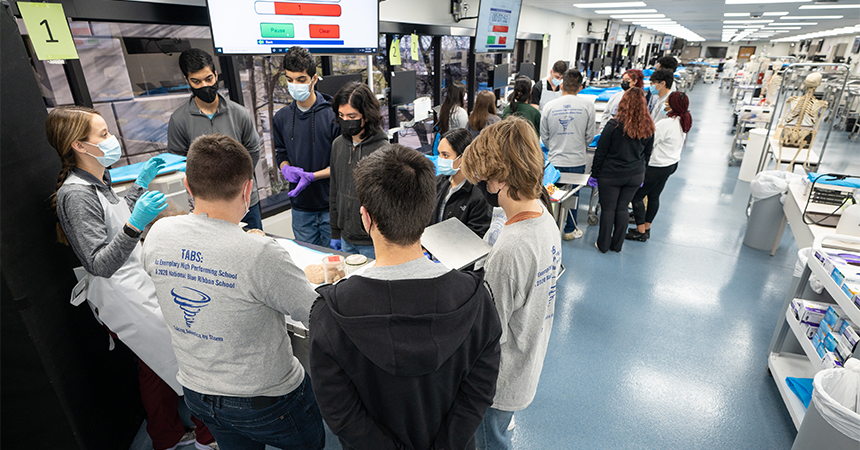TABS Preceptorship program brings biomedical and health careers to life for high school students
- April 7, 2022
- By: Sally Crocker
- Education
Through a partnership with the Fort Worth Independent School District’s (FWISD) Texas Academy of Biomedical Sciences (TABS) early college high school, students interested in biomedical/health professional careers have an opportunity each spring to shadow HSC faculty and fourth-year Texas College of Osteopathic Medicine (TCOM) students, attend medical school lectures, participate in experiences like anatomy lab and explore their options for college and the future.
This year marks the 10th TABS senior class preceptorship hosted at the University of North Texas Health Science Center at Fort Worth campus. These graduating seniors have interests in research, medicine, dentistry, veterinary science, allied health, biomedical careers and related areas.
“It’s especially exciting that as we are hosting new students each year, we are also seeing previous years’ TABS graduates back on the HSC campus today as medical and biomedical sciences graduate school students,” noted Rachel Menegaz, PhD, director of HSC-TABS Outreach Programs, and assistant professor, Center for Anatomical Sciences, HSC Department of Physiology and Anatomy.
“We also enjoy keeping up with former TABS students in other graduate programs around the country to see where their career paths are taking them,” she continued.
Rachelle Wanser, valedictorian of the first TABS graduating class who went on to complete a summer research project at HSC while working on a bachelor’s degree at Johns Hopkins University, is now a 2023 MD candidate at Baylor College of Medicine.
“TABS is a very unique high school that provided me with a multitude of opportunities for expanding my education,” she said. “Throughout my four years with TABS, I gained many memorable experiences. The classroom seemed to have a different feel — it was not just a place for lectures, but also for hands-on learning.”
Because HSC today partners with TABS on programs for every high school level — including a weeklong Summer Bridge program introducing the concept to students during their transitional summer from 8th to 9th grade, as well as tutoring and the HSC Explore research internship program — students gain an understanding of biomedical sciences, health terminology and career paths they can pursue.
“Taking college-level classes alongside college students not only pushed me academically, but socially as well,” Wanser said. “I learned to be comfortable working with people who were sometimes far above me in age and who had completely different world experiences.”
“Early college high schools are definitely challenging, but they are one of the most rewarding opportunities for students,” she added. “The hard work you put in pays off in unimaginable ways farther down the road.”
It was during her junior year that Wanser was first introduced to HSC and TCOM, when she and a classmate were chosen to pilot a new addition to the TABS curriculum, which would become the HSC hands-on experience. She credits this experience for cementing her desire to pursue medical school and become a physician.
“I learned what it means to be a doctor through the lectures,” she said. “After talking with HSC students who shared their own experiences and motivations, I knew for certain that what I wanted for my own future was to also become a doctor.”
Dr. Menegaz agrees that TABS students gain so much by seeing themselves in HSC’s students.
“Our HSC students are relatable,” she said. “In talking about their own backgrounds and how they got into medical school, they provide mentorship and answer career-goal questions that a high school student might not ask a faculty member.”
This year’s Spring Preceptorship program met weekly from mid-February through mid-March, covering musculoskeletal and nervous system anatomy, cardiovascular and pulmonary anatomy and gastrointestinal and renal anatomy.
Current HSC faculty facilitators included assistant professor Rehana Lovely, PhD; associate professor Armando Rosales, MD and assistant professor Emma Handler, PhD.
“Being part of TABS since 2017 has truly been a rewarding experience,” Dr. Lovely said. “It has been a pleasure having this opportunity to introduce children to the health care field at an early stage of their career planning and hopefully inspire some of them toward this field.”
Rustin Reeves, PhD, director of the HSC Center for Anatomical Sciences, was one of the program’s co-founders in 2010, partnering with FWISD’s superintendent at that time. Dr. Reeves has continued to serve as HSC’s TABS Coordinator since then. He currently works with a student from TABS’ 2014 graduating class, who completed the HSC MS in Medical Science degree and now works on the Center for Anatomical Sciences’ Willed Body Program team.
“I am very proud of what this student has accomplished and what all of our TABS students are achieving,” he said.
“Dr. Menegaz, as well, has done a wonderful job moving the TABS Summer Bridge Program forward and overseeing other HSC-TABS events,” he added. “She is truly dedicated to the students and program and has introduced new ideas that have vastly improved our outreach.”
HSC hosts approximately 100-200 TABS students for most on-campus activities. Many of these students are first-generation to college. The program briefly moved virtual during COVID-19, and returned to campus in 2022.







Social media